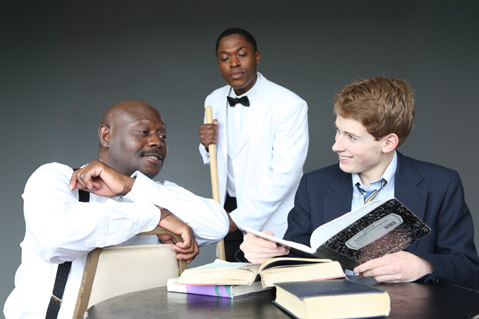Rubicon Theatre Presents “Master Harold” … and the Boys
Athol Fugard’s South African Play Gives Account of Life Under Apartheid

In 1982, when “Master Harold” … and the Boys debuted and the damage of apartheid was still fresh, politics nearly overshadowed Athol Fugard’s immense literary achievement. Today his autobiographical account of how a 17-year-old white South African boy named Hally comes to repudiate the closeness he has experienced with Willie and Sam, the two black waiters who staff his parents’ Johannesburg tea shop, stands more visibly in the ranks of canonical English-language drama, yet without losing any of its evident political immediacy. This production, directed by Brian McDonald and starring Daniel Stewart as Hally, Anthony J. Haney as Sam, and Chris Erric Maddox as Willie, is likely to be one of the highlights of the theater season.
As a child, Hally seeks shelter from his abusive, alcoholic father, a wounded war veteran with a dreadful temper. Sam and Willie take him in and teach him to build and fly a kite. Later, when Hally reaches young manhood, the men again come to his aid in the composition of a school essay on the beauty and freedom of the ballroom dance floor. In the play’s powerful final act, Hally, terrified at the thought of his father’s imminent return, lashes out at “the boys” in the racist language that he has inherited from his parents. The writing is flawless and the opportunities for a gifted ensemble to make this material soar are everywhere. The show opens on Saturday, February 12, at the Rubicon Theatre (1006 E. Main St., Ventura) and runs through Sunday, March 6. For tickets, call 667-2900 or visit rubicontheatre.org. I spoke with director Brian McDonald last week and he gave the following three reasons why you should see “Master Harold” … and the Boys.
1. You Might Learn Something: “Fugard is always teaching in this play,” McDonald told me, “and the lesson is that, like ballroom dancers, we must strive to learn the steps of life. This is how the value in dreams becomes real—by people making an effort.”
2. The Decision Is Yours: “The hopeful nature of this play comes from the fact that Hally does make a choice at the end, which means that he could decide otherwise on another day,” said McDonald. “It’s not a happy ending, but it does leave open the possibility that tomorrow we could all make better decisions.”
3. Some Things Are Worth Fighting For: “Hally oscillates between hope and despair,” said McDonald, “and that’s because he is faced with a big choice, which is whether to accept an unjust world, or to fight against it. Learning to take up that fight is what Master Harold is about.”



